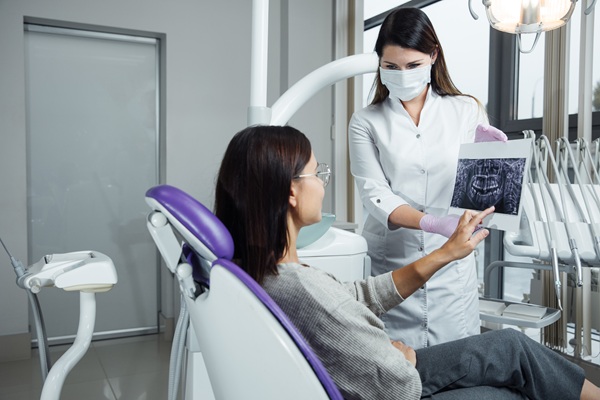FAQs About Botox® for TMJ

BOTOX® for TMJ can address the symptoms that come with this chronic and enigmatic jaw disorder, and while BOTOX for TMJ may sit in the category of experimental treatment, it can deliver results to patients who fail to respond to more conservative treatments. If this is you, it is a good idea to read up on what BOTOX is, how it works, and what it can do for you. An efficient way to learn more about this treatment option is by reading the answers to FAQs on the subject.
The principle behind BOTOX for TMJ
BOTOX is famous for its cosmetic applications, where it smooths wrinkles to restore the youthful nature of the face. An overly enthusiastic application of the treatment is a comedic trope in TV and film.
The abilities of BOTOX come down to its paralytic nature. BOTOX is a derivative of botulinum toxin, a poison from the bacteria that cause botulism. These bacteria can grow in foods like old, poorly preserved tomato paste. If ingested, they can cause severe food poisoning that presents as paralysis that can be fatal without timely treatment.
TMJ is a jaw disorder that causes the muscles of the jaw to contract. This can result in teeth grinding, soreness, headache, and overall facial pain. BOTOX paralyzes the jaw muscles, which prevents them from clenching. This in turn, prevents teeth grinding and the soreness that comes with jaw clenching. Here are a few BOTOX FAQs and their answers.
1. What should a patient expect from a BOTOX procedure?
It takes around half an hour to get BOTOX shots for TMJ. After evaluation and diagnosis, the dentist may use a topical anesthetic to numb the BOTOX injection sites. They will proceed to inject the following:
- Upper and lower jaw muscles, depending on the dentist’s diagnosis
- Temples
- Forehead
The patient may experience discomfort from the effect of BOTOX on muscle tissue. However, it should go away in a day or two.
2. How long does it take to recover from BOTOX?
The patient can leave the dentist’s office and get right back to their daily routine. So, the answer to this question is that BOTOX for TMJ treatments do not require a recovery period.
3. Does BOTOX require any at-home after-care?
The dentist may prescribe over-the-counter painkillers to help with the discomfort of the BOTOX shots. They will also advise their patient to remain upright in the hours following the procedure. Patients should also avoid rubbing the injection sites. The point is to avoid spreading the BOTOX to places that it does not need to be.
4. Does BOTOX come with side effects?
It depends. Some patients go through the procedure with no side effects, while others experience redness and discomfort at the injection sites. The dentist will prescribe home remedies to help with these.
Some patients will experience muscle weakness and eye droop in the days following the injection. Persons who know that they have adverse reactions to BOTOX should consider another course of treatment.
5. How long do the effects of BOTOX for TMJ last?
The jaw muscles will remain relaxed for three months, more or less. During this period, the patient should enjoy a mouth that is free of pain and teeth grinding.
6. Is BOTOX for TMJ treatment a standalone solution?
TMJ treatment treats the symptom of the disorder, which is jaw clenching. It does not treat the root cause of the problem, which could come down to stress, a bad bite, a jaw malformation, or an injury. A dentist will always advise their patient to use BOTOX treatments as a stop-gap measure and continue to pursue a more permanent solution to TMJ.
Let us help you kick TMJ discomfort to the curb
Our dentist can make custom treatment plans for patients who suffer from TMJ disorders. They can attest to the fact that BOTOX for TMJ can offer relief where more conservative treatments fail.
Call our offices, and make an appointment to take advantage of the dentist’s experience. They will be happy to improve your quality of life with a course of treatment that suits your unique needs.
Request an appointment here: https://davisanddingle.com or call Davis & Dingle Family Dentistry at (803) 567-1804 for an appointment in our Columbia office.
Check out what others are saying about our dental services on Yelp: BOTOX for TMJ in Columbia, SC.
Recent Posts
Are you looking for a way to improve your smile with cosmetic dentistry? Botox is an innovative method that has helped many patients address issues such as a gummy smile, aging lines, and more. This review discusses how a dentist can use Botox to improve your smile long-term.Botulinum toxin A, or Botox for short, is…
People generally associate Botox® with facial cosmetic treatments. However, botox can also be used by dentists to alleviate various conditions of the jaw. As a muscle relaxant, Botox can relieve tooth-grinding and similar bad habits. This, in turn, can help reduce ongoing damage to the teeth. Before scheduling an appointment, it is important to know…
Botox® is most widely known as a cosmetic treatment that is commonly used to reduce wrinkles and fine lines. Many people do not know that Botox® can also be used for dental benefits. Dentists use it partly for cosmetic benefits but also to relieve some dental conditions ranging from mild to severe cases, such as TMJ…
Are you looking for a way to improve your smile with cosmetic dentistry? Botox® is an innovative method that has helped many patients address issues such as a gummy smile, aging lines, and more. This review discusses how a dentist can use Botox to improve your smile long-term.Botulinum toxin A, or Botox for short, is…


